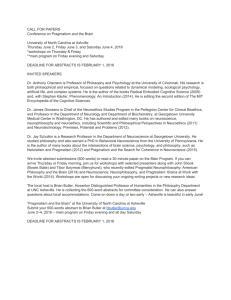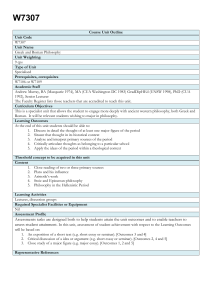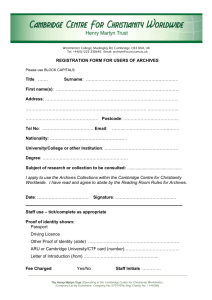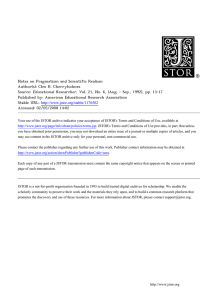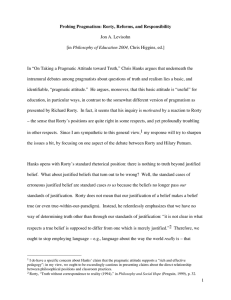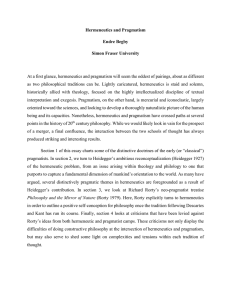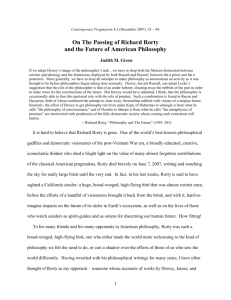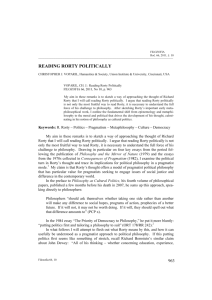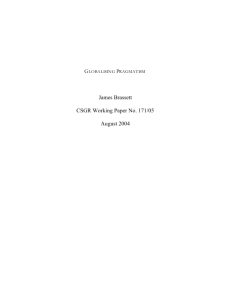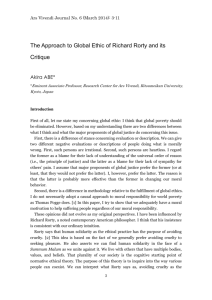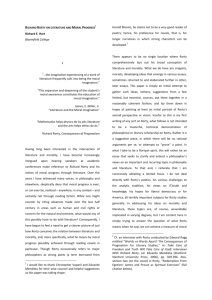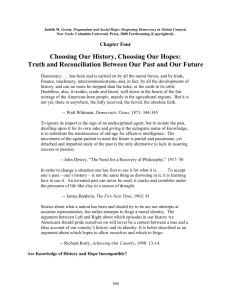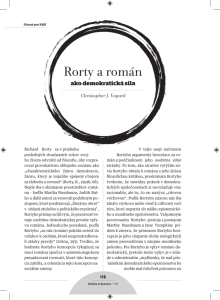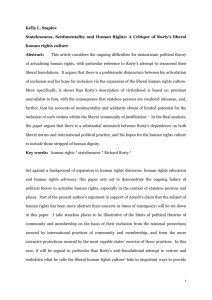New Pragmatism
advertisement
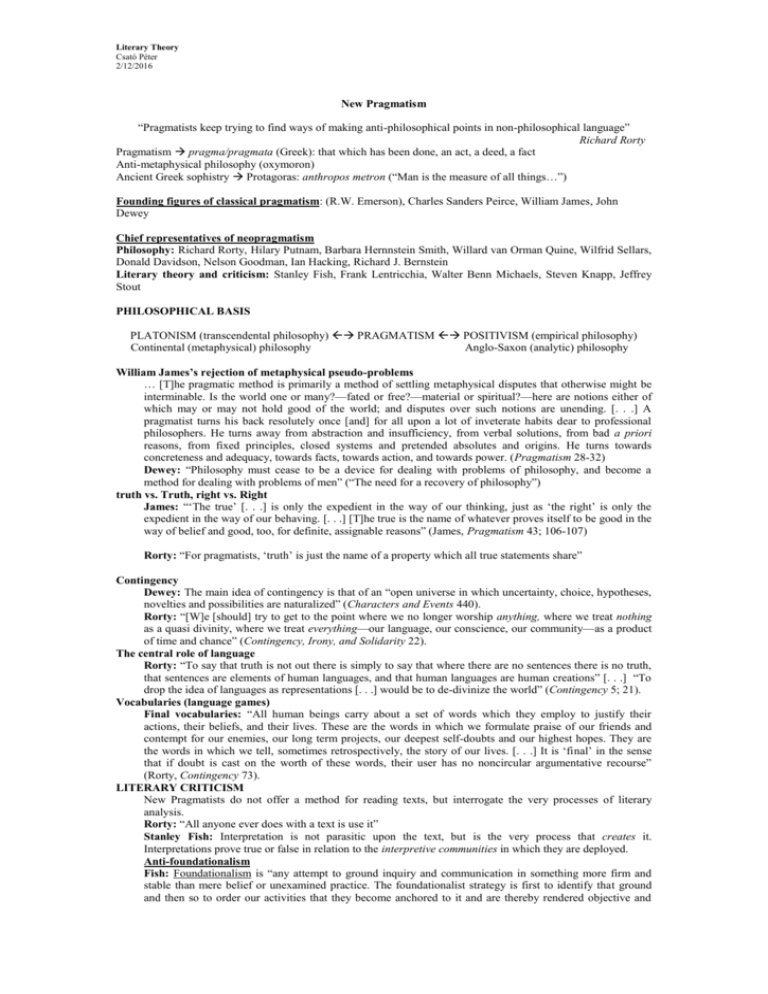
Literary Theory Csató Péter 2/12/2016 New Pragmatism “Pragmatists keep trying to find ways of making anti-philosophical points in non-philosophical language” Richard Rorty Pragmatism pragma/pragmata (Greek): that which has been done, an act, a deed, a fact Anti-metaphysical philosophy (oxymoron) Ancient Greek sophistry Protagoras: anthropos metron (“Man is the measure of all things…”) Founding figures of classical pragmatism: (R.W. Emerson), Charles Sanders Peirce, William James, John Dewey Chief representatives of neopragmatism Philosophy: Richard Rorty, Hilary Putnam, Barbara Hernnstein Smith, Willard van Orman Quine, Wilfrid Sellars, Donald Davidson, Nelson Goodman, Ian Hacking, Richard J. Bernstein Literary theory and criticism: Stanley Fish, Frank Lentricchia, Walter Benn Michaels, Steven Knapp, Jeffrey Stout PHILOSOPHICAL BASIS PLATONISM (transcendental philosophy) PRAGMATISM POSITIVISM (empirical philosophy) Continental (metaphysical) philosophy Anglo-Saxon (analytic) philosophy William James’s rejection of metaphysical pseudo-problems … [T]he pragmatic method is primarily a method of settling metaphysical disputes that otherwise might be interminable. Is the world one or many?—fated or free?—material or spiritual?—here are notions either of which may or may not hold good of the world; and disputes over such notions are unending. [. . .] A pragmatist turns his back resolutely once [and] for all upon a lot of inveterate habits dear to professional philosophers. He turns away from abstraction and insufficiency, from verbal solutions, from bad a priori reasons, from fixed principles, closed systems and pretended absolutes and origins. He turns towards concreteness and adequacy, towards facts, towards action, and towards power. (Pragmatism 28-32) Dewey: “Philosophy must cease to be a device for dealing with problems of philosophy, and become a method for dealing with problems of men” (“The need for a recovery of philosophy”) truth vs. Truth, right vs. Right James: “‘The true’ [. . .] is only the expedient in the way of our thinking, just as ‘the right’ is only the expedient in the way of our behaving. [. . .] [T]he true is the name of whatever proves itself to be good in the way of belief and good, too, for definite, assignable reasons” (James, Pragmatism 43; 106-107) Rorty: “For pragmatists, ‘truth’ is just the name of a property which all true statements share” Contingency Dewey: The main idea of contingency is that of an “open universe in which uncertainty, choice, hypotheses, novelties and possibilities are naturalized” (Characters and Events 440). Rorty: “[W]e [should] try to get to the point where we no longer worship anything, where we treat nothing as a quasi divinity, where we treat everything—our language, our conscience, our community—as a product of time and chance” (Contingency, Irony, and Solidarity 22). The central role of language Rorty: “To say that truth is not out there is simply to say that where there are no sentences there is no truth, that sentences are elements of human languages, and that human languages are human creations” [. . .] “To drop the idea of languages as representations [. . .] would be to de-divinize the world” (Contingency 5; 21). Vocabularies (language games) Final vocabularies: “All human beings carry about a set of words which they employ to justify their actions, their beliefs, and their lives. These are the words in which we formulate praise of our friends and contempt for our enemies, our long term projects, our deepest self-doubts and our highest hopes. They are the words in which we tell, sometimes retrospectively, the story of our lives. [. . .] It is ‘final’ in the sense that if doubt is cast on the worth of these words, their user has no noncircular argumentative recourse” (Rorty, Contingency 73). LITERARY CRITICISM New Pragmatists do not offer a method for reading texts, but interrogate the very processes of literary analysis. Rorty: “All anyone ever does with a text is use it” Stanley Fish: Interpretation is not parasitic upon the text, but is the very process that creates it. Interpretations prove true or false in relation to the interpretive communities in which they are deployed. Anti-foundationalism Fish: Foundationalism is “any attempt to ground inquiry and communication in something more firm and stable than mere belief or unexamined practice. The foundationalist strategy is first to identify that ground and then so to order our activities that they become anchored to it and are thereby rendered objective and Literary Theory Csató Péter 2/12/2016 principled. The ground so identified must have certain (related) characteristics: it must be invariant across contexts and even cultures; it must stand apart from political, partisan, and ‘subjective’ concerns in relation to which it must act as a constraint; and it must provide a reference point or checkpoint against which claims to knowledge and success can be measured and adjudicated” (“Anti-Foundationalism and Theory Hope” 342). Anti-foundationalism “teaches that questions of fact, truth, correctness, validity, and clarity can neither be posed nor answered in reference to some extracontextual, ahistorical, nonsituational reality, or rule, or law, or value; rather, anti-foundationalism asserts, all of these matters are intelligible and debatable only within the precincts of the contexts or situations or paradigms or communities that give them their local and changeable shape. [. . .] In short, the very essentials that are in foundationalist discourse opposed to the local, the historical, the contingent, the variable, and the rhetorical, turn out to be irreducibly dependent on, and indeed to be functions of, the local, the historical, the historical, the contingent, the variable and the rhetorical” (344-45). p.43 Jacobs-Rosenbaum Levin Thorne Hayes Ohman Anti-theory Steven Knapp and Walter Benn Michaels: “Contemporary theory has taken two forms. Some theorists have sought to ground the reading of literary texts in methods that designed to guarantee the objectivity and validity of interpretations. Others, impressed by the inability of such procedures to produce agreement among interpreters, have translated that failure into an alternative mode of theory that denies the possibility of correct interpretation” (“Against Theory” 11). SELECTED BIBLIOGRAPHY OF WORKS BY AND ON NEW PRAGMATISTS Rorty, Richard. Philosophy and the Mirror of Nature. Princeton: Princeton UP, 1979. ___________. Consequences of Pragmatism. Minneapolis: Minnesota UP, 1982. ___________. Contingency, Irony, and Solidarity. Cambridge: Cambridge UP, 1989. ___________. Objectivity, Relativism, and Truth. Cambridge: Cambridge UP, 1991. ___________. Essays on Heidegger and Others. Cambridge: Cambridge UP, 1991. ___________. Achieving Our Country: Leftist Thought in Twentieth-Century America. Cambridge, Mass: Harvard UP, 1998. ___________. Truth and Progress. Cambridge: Cambridge UP, 1999. Fish, Stanley. Is There A Text in This Class: The Authority of Interpretive Communities. Cambridge Mass: Harvard UP, 1980. __________. Doing What Comes Naturally. Oxford: Clarendon, 1989. Herrnstein, Barbara Smith. Contingencies of Value: Alternative Perspectives in Critical Theory. Cambridge Mass.: Harvard UP, 1988. _____________. Belief and Resistance: Dynamics of Contemporary Intellectual Controversy. Cambridge Mass.: Harvard UP, 1997. Mitchell, W. J. T. Ed. Against Theory. Chicago: The U of Chicago P, 1985. West, Cornel,. The American Evasion of Philosophy: A Genealogy of Pragmatism. Madison: The U of Wisconsin P, 1989. Thayer, H.S. ed. Pragmatism: The Classic Writings. Indianapolis: Hackett, 1982. Diggins, John Patrick. The Promise of Pragmatism: Modernism and the Crisis of Authority. Chicago: The U of Chicago P, 1994.



